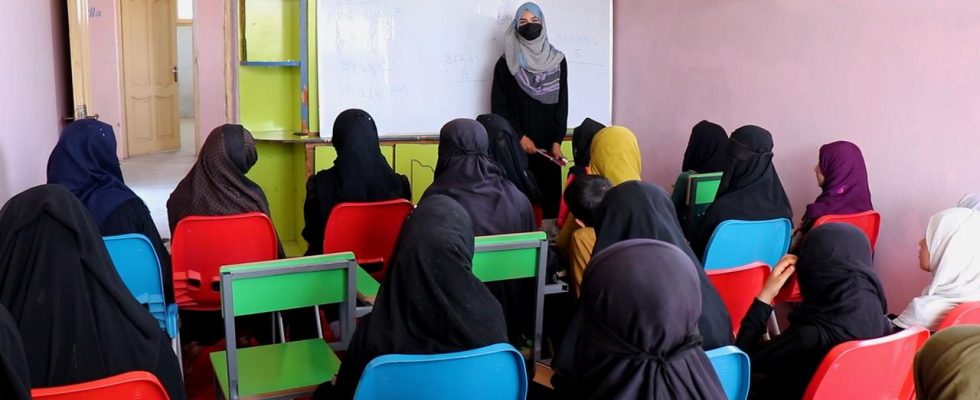world mirror
Afghanistan is now an educational desert for young girls and women. Those who can take secret lessons – or attend a new religious school in Kabul, where modern subjects are also taught.
Manizha is very happy. After two years, the 18-year-old from Kabul is finally going back to school. Since the Taliban came to power, girls after sixth grade have been banned unless they go to a madrassa, a religious school. Manizha is also going there now. Mathematics and English are also taught here. “I wasn’t allowed to go to school for two years, I got mental problems,” she says. “Then I heard about this school and asked my parents for permission to go there.”
It is difficult for Manizha’s family to pay the school fees of five euros a month. Her father can’t find work. The economic situation in Afghanistan is precarious. But her father emphasizes: “I definitely want to pay the school fees. I want my daughter to have a future.”
In July the new madrasa in Kabul was opened. On the same day, the Taliban came from the district and wanted to close the school again: The fact that modern classes are held here alongside religious education is not compatible with Islam. But the director was able to produce a permit from the responsible ministry. The school stayed open. Since then, more than 500 girls and young women have enrolled. Hadia Jabarkhil, manager and teacher, is optimistic: “If the Taliban had anything against this type of madrasa, then we shouldn’t have opened it. We want to open more madrasas.”
The Ministry of Religion did not provide any information on whether this would be possible.
Women teach the girls Islamkunde, mathematics and English.
Some secretly take lessons
The Taliban have turned Afghanistan into an educational wasteland for young girls and women. More than a million of them are denied access to school and university. Families who can somehow afford it invest in secret tuition for their daughters.
For safety reasons, this is only possible in small groups and in constant fear of being discovered. “We’re all afraid of being arrested and that the Taliban will treat us badly,” says Farida, who has been teaching in secret for the past seven months.
Khalida, as we call her, is one of her students. She reports that some of her friends who went to school with her have now been forced into marriage. The 18-year-old is desperate. “I had many wishes. But with the arrival of the Taliban, I lost hope because we can no longer go to school.”
Many girls and women feel hopeless. Being allowed to learn gives them perspective.
hopelessness – and protests
Hopelessness is a widespread feeling among young girls and women in Afghanistan. They are excluded from political and largely public life – the United Nations speaks of gender apartheid in view of this oppression.
But there are women who have the courage to fight for their future and take to the streets in Kabul. One of them is Zholia Pharsi, who has been campaigning against the oppression of women since the Taliban took power. On August 15, the second anniversary of the seizure of power, they want to take their protest against the Taliban to the streets. “When we started fighting for our rights, we lost our fear,” she says. “We thought maybe we’d be arrested or even killed. We accepted all those risks after starting this fight.”

